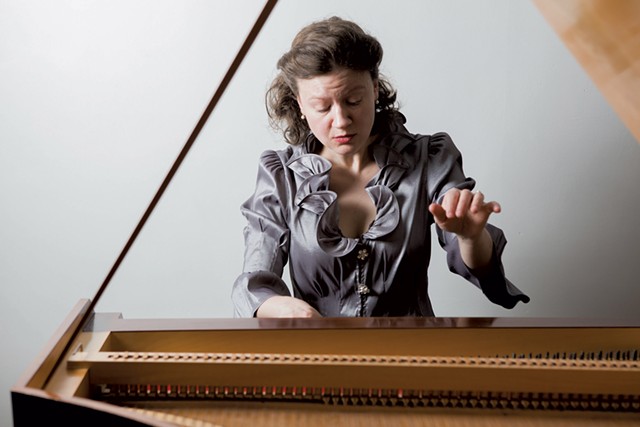
- Courtesy Of Tatiana Daubek
- Sylvia Berry
In 1777, when Wolfgang Amadeus Mozart was 21 years old, he wrote an enthusiastic letter to his father describing a newly popular type of piano. Bartolomeo Cristofori in Florence had constructed a keyboard instrument that looked like a harpsichord but replaced its string-plucking mechanism with hammers wrapped in leather. The fortepiano, as it's now called, introduced a dramatic new element to keyboard playing: dynamics. A performer could hit the keys with more or less force to produce louder or softer sounds.
That letter, among others from the composer's life, will be read at an intriguing concert this Sunday, April 22, at the Plainfield Town Hall Opera House. "The Many Faces of Mozart: A Life Told Through Music and Letters" will intersperse the readings with performances of Mozart's works by Sylvia Berry, a fortepianist based in Somerville, Mass. For the occasion, she will transport a replica of a fortepiano by Anton Walter, the builder of Mozart's piano, to the venue.
Berry, who has studied historical keyboard instruments and related period documents at Oberlin Conservatory of Music and the Royal Conservatory of the Hague, Netherlands, notes that Mozart's tone in that letter is uncharacteristically serious. He was trying to get his father to buy him one of the newfangled instruments, she explains. Otherwise, she says, "He had a silly sense of humor. The movie [Amadeus] was accurate in that respect. He was a transcendent genius but also a totally goofy guy."
Author M.T. Anderson, based in East Calais, will read the letters. Berry has chosen translations by Robert Spaethling, a native of southern Germany who understands Mozart's Austrian dialect and "decided to leave in all the crassness and poop jokes."
Anderson, she adds, also has a sense of humor, "so I know he'll do the funny ones right."
Anderson wrote Symphony for the City of the Dead: Dmitri Shostakovich and the Siege of Leningrad and Handel, Who Knew What He Liked, among other works for youth and adults. He helps plan the Plainfield opera house concert series, now in its second year.
Hearing Mozart's works on a replica period instrument will be revelatory for audiences, Berry promises. "The first time you play these, you can hear everybody suck their breath in," says the pianist, whose collection of historic instruments includes a fortepiano made by John Broadwood in London in 1806.
Unlike the modern piano, which is a product of the late 19th and early 20th centuries, Berry's replica Viennese piano, built by Chris Maene, has five and a half octaves, or about one-third fewer keys. Instead of pedals, knee levers lift the dampers and activate a moderator, which slips a piece of cloth between the hammers and the strings to create a muted sound. Much smaller than their modern cousins, the hammers are wrapped in two thin layers of leather, where felt would be used today.
"That's why these instruments have a more percussive sound," explains Berry. "They don't have the same level of loudness as a nine-foot concert grand, but the extremes of softness and loudness are greater. I've found it's more explosive."
During a piece such as Mozart's Sonata No. 10 — "a hair-raising piece, one of the scariest he wrote," she says — audience members can find themselves "falling out of their chairs."
Built for smaller rooms, the fortepiano also has a level of clarity that modern pianos can't attain. That explains Mozart's tendency to score short, "speech-like" phrasings that strike today's performers as "choppy," Berry notes.
Such clarity allows performers better to approximate the nuances of Mozart's intentions. "His music has these moments of humor. You can make [the instrument] sound like someone is speaking to you, so you can make the musical gestures and jokes happen," Berry says. "His music sounds less precious on these instruments."
Berry previously played harpsichord in a series that Anderson curated on Cape Cod, and the author is a fan. In an email only an award-winning wordsmith would write (Anderson won the National Book Award for Young People's Literature), he enthuses, "Not only does [Berry] have an incredible dexterity and firmness and lightness of touch, she approaches the written score with a particular freshness, creating a sense of quicksilver nuance and shifts of mood. Like a restorer of 18th-century paintings, she strips away the accumulated centuries of smoke, glare and gloom, so that suddenly the scene sparkles again."
For all her investment in creating a historically accurate sound, Berry will present a Mozart who's relatable to the present day.
"People deify these artists," she comments, "but it's so much more interesting to find out they were goofy people with humor and sorrows and all those things. Mozart was a great improviser, like a jazz musician. He was playing to audiences that were really more like jazz audiences. He was the pop music of the day."










Comments
Comments are closed.
From 2014-2020, Seven Days allowed readers to comment on all stories posted on our website. While we've appreciated the suggestions and insights, right now Seven Days is prioritizing our core mission — producing high-quality, responsible local journalism — over moderating online debates between readers.
To criticize, correct or praise our reporting, please send us a letter to the editor or send us a tip. We’ll check it out and report the results.
Online comments may return when we have better tech tools for managing them. Thanks for reading.